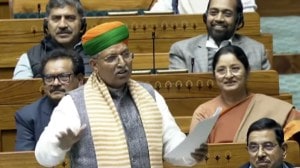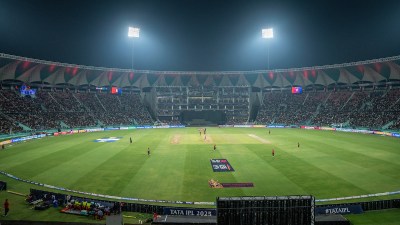Stay updated with the latest - Click here to follow us on Instagram
‘Anti-national slogans’ at event: Year after sedition row, what changed in JNU, and what didn’t
Those organising public meetings were asked to provide details of participants, including name, mobile number and address. Plus, the proceedings were supposed to be recorded.
 Iron grill was put up outside administrative block in December. Express Archive
Iron grill was put up outside administrative block in December. Express Archive
On February 9 last year, an event at JNU to mark the death anniversary of Parliament attack convict Afzal Guru unleashed a national storm after three students were charged with sedition for raising alleged anti-India slogans there. A year on, a look at the big developments at the university: New meeting rules: In August, JNU came out with rules to ensure its “reputation is not harmed”, as per Associate Dean of Students Buddha Singh.
Watch What Else is Making News
Those organising public meetings were asked to provide details of participants, including name, mobile number and address. Plus, the proceedings were supposed to be recorded.
Left and Right: In a bid to defeat the ABVP, which won a central panel seat in the JNU Students’ Union after 14 years, Left organisations AISA and SFI joined hands for the first time and swept the university polls in September.
The elections also saw the rise of BAPSA, an Ambedkarite organisation.
Najeeb disappearance: In October, JNU student Najeeb Ahmad went missing, a day after an alleged on-campus scuffle with ABVP activists. Despite several protests and police teams being formed, he is yet to be traced.
Iron grill: In December, JNU invoked an ordinance to ban programmes at the administrative block. Students were told to protest 20 metres away, and an iron grill was installed at the site of protests.
The administration said it was done to “build more office space”.
Admission policy: In December, 34 Academic Council members said JNU had adopted the UGC gazette notification without it being discussed or passed.
Nine reserved category students were suspended for allegedly disrupting the AC meeting.
The notification, also passed by an Executive Council, is expected to change JNU’s admission policy by cutting down seats in MPhil and PhD, making interview the sole criterion of admissions.
Teachers under fire: In a first, JNU administration issued notices to faculty members in December, threatening them with disciplinary action if they protested at administrative block. The administration also said a committee would be set up against erring teachers.
The resignations: The year saw two Chief Proctors resign. While Krishna Kumar resigned in February last year citing personal reasons, there was speculation it was over handling of the February 9 incident.
In January this year, A P Dimri resigned, allegedly because of “dilution” of his powers by the V-C, and changing of his report on the Najeeb Ahmad case.







